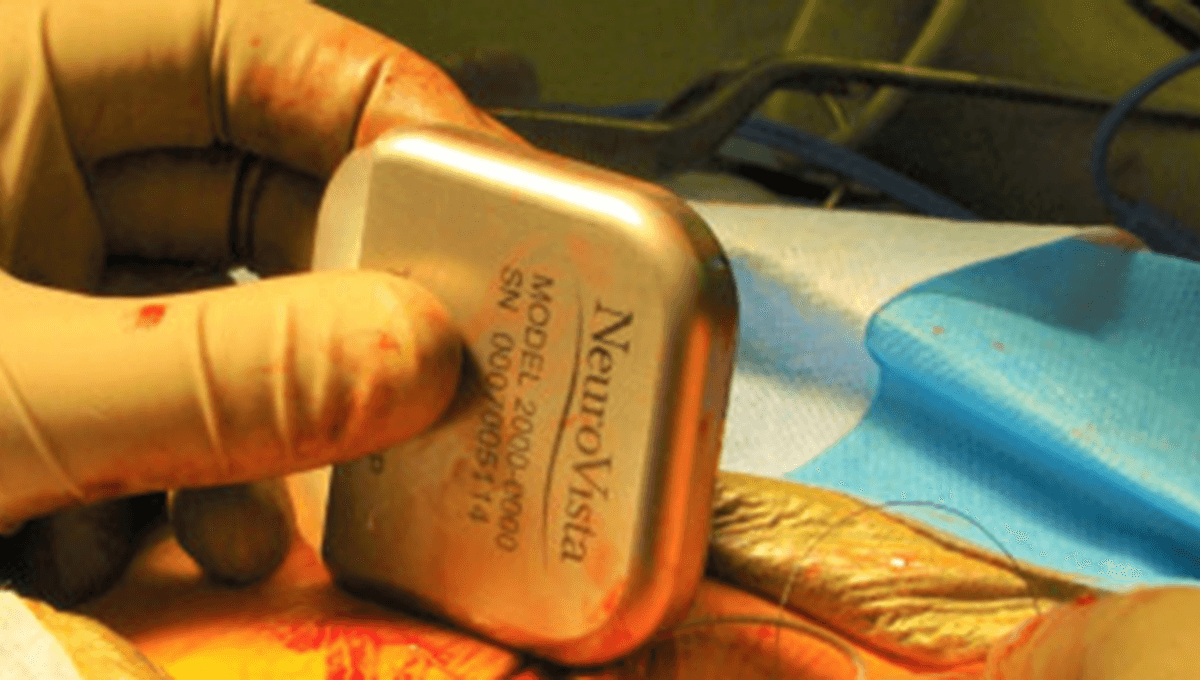
An epileptic patient who was treated with an experimental brain implant has had to have the life-improving device removed after the company that manufactured it went bankrupt.
Rita Leggett was diagnosed with severe chronic epilepsy when she was 3 years old, according to a report on the case published in Brain Stimulation. She tried a number of treatment options over the years, but none helped her manage her condition effectively.
In her late 40s, she was fitted with a Neurovista device, a brain-computer interface (BCI) that aimed to detect upcoming seizures and alert patients to them. Though results from trials of the device were mixed, it worked well for Leggett, who was able to take prophylactic medication like clonazepam to prevent seizures from occurring.
“Remarkably, Patient R went from experiencing an average of three seizures per month to none, thanks to the efficacy of the BCI device,” the team wrote in their report. “Unfortunately, the Neurovista trial was discontinued due to financial constraints, necessitating the explantation of the device from Patient R.”
As well as better managing her condition, the device had a psychological impact on Leggett, allowing her to feel more in control. After receiving a “termination order” from the manufacturer, she attempted to see if she could keep it, but to no avail. Following the removal of the device, against her preferences, the team say she suffered psychological harm.
“To finally switch off my device was the beginning of a mourning period for me,” she told the team. “A loss, a feeling like I’d lost something precious and dear to me, that could never be replaced: It was a part of me.”
Without the device she depended on, she is no longer able to do certain jobs, drive, and socialize as she could with the device in place. The team says that she was in a sort of human-machine symbiotic relationship with the device, relying on it and using it to augment her own “agential capacities”.
“Based on Patient R’s narratives, it seems that she merged with the technology in that her postoperative subjective experiences embodied a new revision of her self-understanding: ‘we became one’; ‘with this device I found myself’.”
The team wrote that the case raised ethical concerns around the rights of any “new person” (i.e. a patient with enhanced abilities that improve their agency, such as Leggett being able to have advanced warning of any seizures) that result from brain implants. They even compared the situation to Blade Runner, where autonomous artificial intelligence agents attempted to evade destruction after an order to terminate them.
“An imposed removal of a BCI may have profound existential side effects […] It was more than a device being explanted from Patient R brain. Rather, the company was responsible for the creation of a new person,” the team wrote in their discussion. “The device was the property of the company, not of the patient, despite the fact she appropriated the de novo agential capacities – resulting in an existential dependency with the BCI. In a way, the company owned the new person; as soon as the device was explanted, that person was terminated.”
The device was fitted in 2010, and removed a few years later. However, she still feels some sense of loss even now.
“We had been surgically introduced and bonded instantly. With the help of science and technicians we became one. We did together what was expected of us! We performed beautifully,” she told the team years later. “To this date, I have never again felt as safe and secure. Nor am I the happy, out-going, confident woman I was.
“I still get emotional thinking and talking about my device, and I miss terribly having the security of it.”
The study is published in Brain Stimulation.
Source Link: Doctors Forced To Remove Patient's Brain Implant After The Maker Went Bust